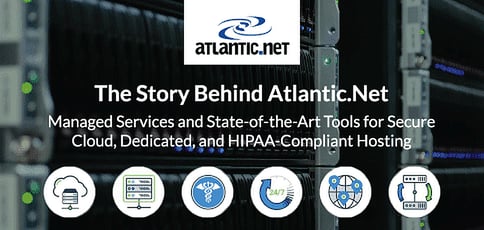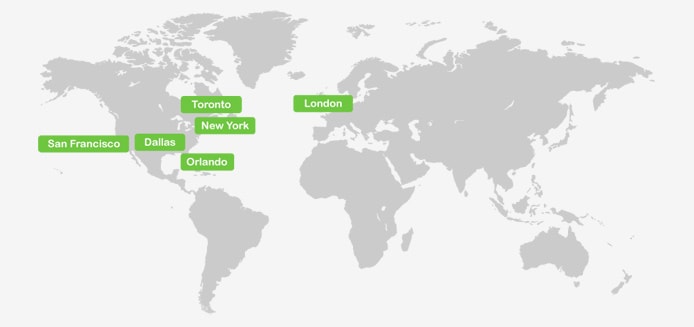
TL; DR: We always enjoy sharing stories of students who struck it rich by starting a tech company in high school or college, but this one has special significance because it happened literally a block away from HostingAdvice headquarters. Marty Puranik and Jose Sanchez were frustrated that the University of Florida didn’t make internet connections available in the early days of the World Wide Web; so, naturally, the students went ahead and became their own ISP. That business, Atlantic.Net, has since evolved into a powerful cloud computing and hosting provider that specializes in HIPAA compliance and technical expertise.
Marty Puranik and Jose Sanchez weren’t out to change the world — they just wanted to connect to the internet. The computer science students thought it was ridiculous the University of Florida didn’t enable students to get online easily in the mid-1990s.
“It sounds really funny today, but web browsers were just coming out and the internet wasn’t commercially available,” Marty said. “We decided we were just going to do it ourselves.”
A computer repair shop Marty ran from his dorm room paid for the first internet connection before the company — originally called Internet Connect Company Computers, or ICC Computers — moved to what Marty described as “a terrible location” a few blocks from campus.
“We built and sold computers the first year because we didn’t have any money,” he said, adding they would post fliers on bulletin boards around the UF campus and nearby area to drum up business. Within a year, the company grew to eight employees and more than 2,000 customers.
Now, Atlantic.Net runs datacenters in New York, London, Toronto, San Francisco, Dallas, and Orlando as a trusted hosting and cloud services provider known for providing customers with ease-of-mind managed services and cutting-edge security, compliance, and stability — all backed by a 100% uptime guarantee.
How Atlantic.Net Adapted Hosting Services as the Internet Evolved
Atlantic.Net grew quickly in part by acquiring other internet service providers and focusing on second-tier markets and rural areas.
As the ISP business cooled off in the early 2000s amid increasing regulations and oversight, Atlantic.Net pivoted to offer colocation and datacenter services, later adding managed hosting, cloud, and virtualization tools.

Marty Puranik founded Atlantic.Net with classmates he met at the University of Florida in the mid-1990s.
Atlantic.Net began providing hosting plans during what Marty calls Version 1.0 of the internet, which was focused on simple technology. The emergence of cloud and virtualization technology around 2010 represents Version 2.0, while he said the hosting industry currently resides in Version 3.0, with the proliferation of mobile devices and interconnected services.
“You’re not selling just the server anymore, you’re selling a whole host of other products around it,” Marty said. “You need to have a firewall, and you need intrusion detection. It’s not just about the main course anymore, you’ve got to have the appetizer and dessert — the whole meal.”
High-Quality Tools Illustrate the Difference Between Cost and Price
Marty regularly challenges potential customers by asking if they’re more concerned about the cost or the price of a hosting account.
“Most people think it’s the same thing,” he said, explaining that he considers the price to mean the up-front costs of hosting, while the cost includes long-term investments such as time spent managing various services or reacting to issues.
“Obviously, our prices have to be competitive, but we’re not price-driven at all,” Marty said. “We’re really driven by what people are saying, which is usually along the lines of, ‘My business is on the line. If I’m spending a few extra bucks to avoid all sorts of problems, it’s worth it.'”
Protecting Customers From Latest Ransomware and Security Threats
Several Atlantic.Net customers were infected by the WannaCry ransomware attack earlier in 2017, but the antivirus program and other security tools the company deploys quarantined the files and kept users’ data safe.
“It was really cool to go to the customers and say, ‘This big thing that happened that you saw on TV? You were infected, but you weren’t affected,'” Marty said. “It was great to show them how we helped them dodge a bullet.”
Measuring Success Through Customer Experience
Before the attack, Atlantic.Net had been using a cost-effective antivirus program that wasn’t working well. The company opted to switch to a more expensive — and more effective — alternative.
The antivirus software is just one example where Atlantic.Net disregards the balance sheet in favor of providing reliable, useful services and helping customers understand the value.
“We look at it like our customers’ business is our business,” Marty said. “We help them avoid a lot of the potholes and try to make them aware of any risks they have, where a lot of other hosting companies try to sell products at the lowest price to get the sale.”
Managed Services Ease the Strain on Seasoned Developers
Marty compares Atlantic.Net’s hosting services to home improvement projects and stores: “You can go into Home Depot, do it yourself, and buy everything you need to change the thermostat, or you can go get a contractor who will take care of everything for you.”
In addition to an on-demand managed cloud package, Atlantic.Net offers a self-service model for the computing experts who are prone to saying, “I just want to get online, set everything up by myself, and get out of my way,” Marty said.
As self-service hosting has become more complicated during what Marty calls Version 3.0 of the internet, more developers and businesses — regardless of their technical expertise — are opting for Atlantic.Net’s managed services.

Over the course of 20 years, Atlantic.Net has expanded its network to include datacenters in three countries.
“The thinking always was that when developers came in, they would want a self-serve model, but it actually turns out they are coming to the conclusion that it is getting harder and more complex to keep up with things like patch management,” Marty said. “They don’t want to be responsible for the low-level things that would be relatively inexpensive to outsource to a company like us.”
Even developers capable of setting up an intrusion detection system, configuring a load balancer, or implementing a disaster recovery tool often opt to pass those elements to Atlantic.Net experts.
“These things either didn’t exist five years ago or were reserved for enterprises,” Marty said. “People who don’t work with that stuff every day might not be comfortable with the responsibility or look for us to take care of things faster and with fewer headaches.”
Atlantic.Net’s Growing Team and the Long List of Upcoming Features
Atlantic.Net left Gainesville around 2004, opting for the nearby office and datacenter in Orlando, where the company became the first ISP to offer high-speed dial-up. Marty said the core team in Orlando is currently around 30 people, but he expects that number to grow.
“We are hiring and looking for pretty much everything,” he said. “SysAdmins, developers… anybody who has some background in the hosting industry can find something to do here.”
Atlantic.Net stays busy by consistently building out new features in response to customer inquiries and the continually evolving industry.
In addition to becoming among the first cloud hosting providers to announce cloud support for Docker and Windows Server Containers, Atlantic.Net will soon launch on-demand block storage and replication services.
“We’ve got all kinds of tools to make things a lot faster and easier, in addition to taking away a lot of headaches to make hosting more fun,” Marty said.
HostingAdvice.com is a free online resource that offers valuable content and comparison services to users. To keep this resource 100% free, we receive compensation from many of the offers listed on the site. Along with key review factors, this compensation may impact how and where products appear across the site (including, for example, the order in which they appear). HostingAdvice.com does not include the entire universe of available offers. Editorial opinions expressed on the site are strictly our own and are not provided, endorsed, or approved by advertisers.
Our site is committed to publishing independent, accurate content guided by strict editorial guidelines. Before articles and reviews are published on our site, they undergo a thorough review process performed by a team of independent editors and subject-matter experts to ensure the content’s accuracy, timeliness, and impartiality. Our editorial team is separate and independent of our site’s advertisers, and the opinions they express on our site are their own. To read more about our team members and their editorial backgrounds, please visit our site’s About page.

